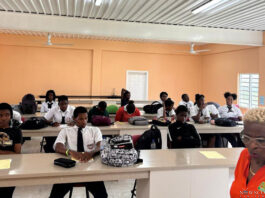
By Robert A. Emmanuel
A High Court judge in the high-profile case relating to the popular online media platforms, Antigua News Room (ANR) and Antigua Breaking News (ABN), has ordered the entities to issue an apology to the court regarding sensitive information published on their websites.
The two organisations were subpoenaed to appear in the High Court to answer a contempt of court charge last month, after being accused of publishing “privileged information” on the Mikhail Gomes murder case, in violation of a court gag order.
Justice Colin Williams was said to have barred all news media from publishing details relating to a closed hearing where Mikhail Gomes is accused of killing his ex-girlfriend Vincia James in 2018.
A representative for Antigua News Room—an administrative assistant—attended court yesterday to hear the judge’s ruling, however no representative was present for Antigua Breaking News.
Last week, the staff member appeared before the court as the news entity’s representative to answer to a contempt of court charge, however Justice Williams requested her to return with legal counsel, as she was facing a potential fine or imprisonment.
At the hearing today, the attorney representing the staff member, attorney Leon ‘Chaku’ Symister, pledged to inform Antigua Breaking News of the court’s decision.
Williams explained to the attorney the reason for the gag order, and how the published articles could have compromised the murder trial.
However, Symister argued that his client was ill-equipped to answer the court as she was neither responsible for the posting or publishing of any articles, nor had she any knowledge of the content published.
The judge explained that when Antigua Breaking News published the confidential matter along with things that did not happen, Antigua News Room reposted the information and was then contacted by the court that they were in breach of the gag order.
They committed the breach again with a second post, leading to an order for both entities to appear in front of the court.
He then suggested to the court that the individual responsible for the media sites’ main operations should be called to answer the court as they would have the relevant information.
The attorney then noted that if the courtroom was cleared and no media personnel were present, someone within the court must have disclosed the information to the press, contrary to the gag order.
He later asked the court to adjourn the matter and excuse the staff member until the head of Antigua News Room could be found.
Justice Williams rebutted, saying that the person in question has been out of state for some time, and there was no by-line or source quoted.
Symister responded saying that Antigua News Room is not registered under the Company Act and reiterated that his client was the wrong person to give account to the court.
Both Williams and Symister concluded that a written apology should be issued to the court by Antigua News Room and Antigua Breaking News.
Meanwhile, at the post-Cabinet press briefing yesterday, Cabinet spokesperson and Information Minister, Melford Nicholas, reiterated that stricter laws are needed to regulate the country’s media space.
“The challenge is that there needs to be a new legislative framework—I would have discussed this at Cabinet yesterday with the Attorney General—and it is how do we look at a media house that is doing major publication, and which bit of legislation would be the one that affects them,” he said.
He added that anonymous online publications have benefitted from a lack of accountability and transparency, compared to the traditional media houses.
“At the very least, for the protection of all concerned, a media house ought to be able to publish its editor.
“We should know who the editor is, and who is the producer that, in the event of any potential liability for even defamation or tort, those persons can be brought to answer questions,” he explained.



